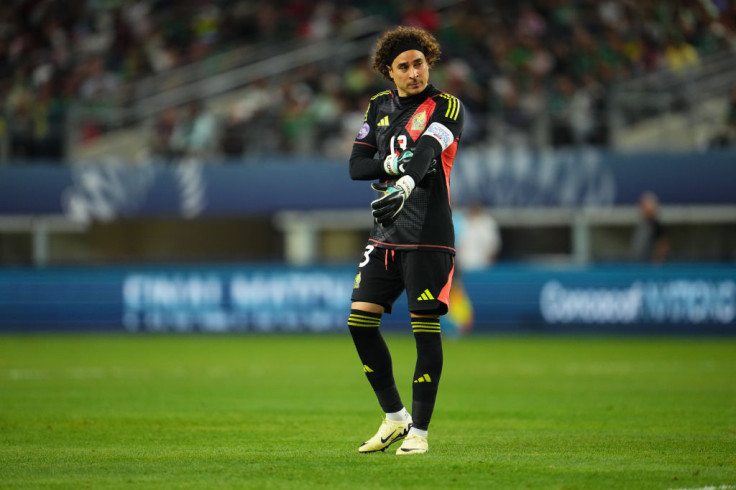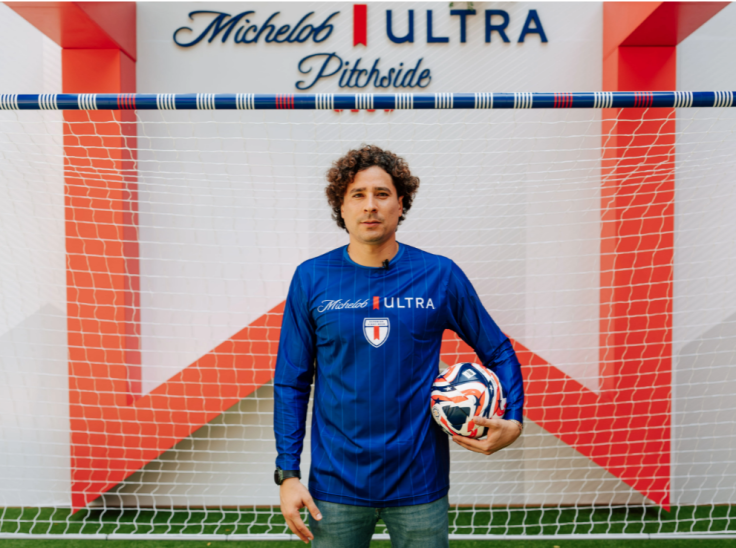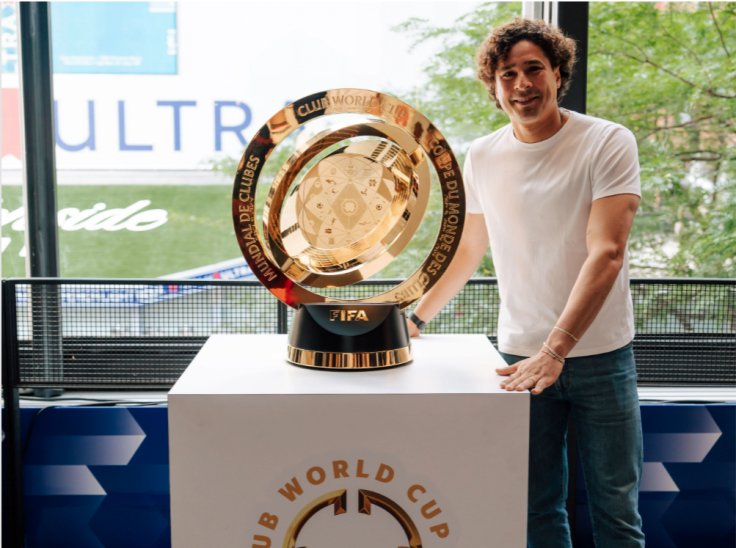
Not many soccer players can say they have competed in a FIFA World Cup, and even fewer can say they left their mark on millions with performances at the world's most-watched sporting event.
But that is the case for Mexican goalkeeper Guillermo Ochoa, who for a generation has done exactly that. Known for his legendary saves and unmistakable curls, Ochoa has cemented his status a household name in Mexican soccer.
Fresh off a record sixth Gold Cup title with the Mexican national team, Ochoa spoke to The Latin Times about what could be the final World Cup cycle of his career and how he's approaching the last chapters of his life as a professional footballer.
"I have mixed feelings," Ochoa said. "I've been to a lot of Gold Cups, and this sixth one meant making history. Becoming the most decorated player in the region is not easy. It was very special because I know the end is near. It's inevitable."
Ochoa made his professional debut for Club América in February 2004 at just 18 years old, replacing longtime goalkeeper and fan favorite Adolfo Ríos, who suffered an injury and eventually retired at the end of the season.
"I was surprised when he started training with the first team. Ochoa was 18. I won't lie, it was hard for me to step aside, but I knew América's goal was in excellent hands," Ríos said in a 2018 interview.
Since then, Ochoa has become a key figure in Mexican soccer, representing the national team in five World Cups and enjoying a successful career in Europe. And while he's nearing the end of his playing days, the veteran goalkeeper said he's focused on enjoying every moment he has left.
When asked about his goal to earn a spot at the 2026 World Cup, Ochoa admitted this cycle has felt different compared to previous ones.
"When the 2022 World Cup ended, everyone thought I was going to retire from the national team. But I always told myself that I wanted to play one more," he said. "Playing one more would mean going to a sixth World Cup, and no one has done that before. Of course, people doubted me, but I feel great. I still have a lot to give to the team."
"I'm just trying to enjoy whatever time I have left. Yes, it's one of my goals, but I don't see it as an obsession. If it happens, I'll be happy. If not, I'll be proud that I gave it my best until the very end. I'm working hard to earn my spot, and if I don't play, I'll embrace whatever role I have and do my best to help the team."
Although he was part of Mexico's Gold Cup–winning squad this summer, Ochoa didn't get any play time. After years as a starter, he said it's a role he's learned to embrace.

"I've talked to Javier Aguirre, and he's keeping me in mind," Ochoa said, referring to Mexico's head coach. "He tells me to stay in shape and be ready in case I get the chance to contribute on the field."
Ochoa said his role has shifted as he nears the end of his playing career.
"I'm at a point where the most important thing is to be a positive influence on the squad," he said. "I'm not there to make things more complicated. That's what we need right now, especially with a team that doesn't have much international experience. They don't fully know yet what it's like to go through long training camps or what it takes to be a professional on and off the field, all those little things matter."
One of Ochoa's biggest motivators in aiming for the 2026 World Cup is Mexico's performance in the 2022 edition. El Tri finished third in its group behind Argentina and Poland, breaking a streak of seven consecutive World Cups in which the team reached the knockout rounds.
"I think everything should be taken as a life lesson," Ochoa said. "We knew it wasn't going to be easy. Sometimes people build high expectations for Mexico, but, outside the country, that isn't always the case. I've said before that we live in a bubble. We stay in Liga MX and don't see what's happening elsewhere. Many countries have improved their leagues and developed stronger national teams. There are no easy opponents anymore. That's what we need to learn. We have to prepare for every game, because nobody is going to give us anything."
Looking ahead to 2026, Ochoa said the tournament's return to Mexican soil gives the team a rare advantage.
"The World Cup in Mexico is an incredible opportunity, and I think it gives us something in our favor," he said. "We've rarely lost playing at home at the Estadio Azteca."
That idea of living in a bubble, Ochoa said, applies just as much off the field as on it. He believes the comfort of Liga MX has kept many players from challenging themselves abroad.
"I say we're in a bubble because in the Mexican league, players are paid well and feel comfortable," he said. "But when you leave that behind—being far from your family, starting over in another country, earning less—it's not easy."
"You're going to take hard punches, but that's the only way to open your eyes, to take control of your career, and to make that next leap. If you don't take risks, if you don't push yourself, you don't know how far you can go. Personally, I'd like to be an example for the younger players, a symbol of resistance, endurance, and not going back to my country at the first chance."
While talking at the Michelob ULTRA's Pitchside Club in New York City, Ochoa also celebrated the growth soccer has had in the United States in recent years.
"Before it was NFL, MLB, NBA," he said. "But now, in soccer, it seems they've found the key to get more people interested in the sport. There are more and more tournaments being held here, and each one represents an opportunity to bring people closer to soccer."

With so many tournaments and games taking place on U.S. soil, Ochoa has become a frequent visitor, gaining a perspective on the complex social and political climate in the United States, one shaped by his experiences as an athlete but shared by millions nationwide and especially personal to him as a Mexican and Latino.
"The sociopolitical context in the U.S. is complicated," he said. "As a professional soccer player, even though you have a strong voice and reach in many ways, in the end you can't change much because you just play soccer. What you can do is bring people together, unite them through the sport."
Ochoa said the current situation affects him and his teammates not only as athletes but as Mexicans and Latin Americans, many with friends, family or acquaintances living in the U.S.
"I know people who have come to the U.S. to work, to look for a better life, and those are the people who move this country. I've been fortunate to be here in New York many times, and in the restaurants, I've been welcomed by Mexican workers in the kitchens who offer me every little detail. As a soccer player, you want to do more for them, but right now, in this sociopolitical climate, the noise from protests and demonstrations is rarely reaching those who make decisions."
"This is a country full of diversity. You've seen it already—Latinos and people from all over the world come and sell out stadiums, sell out concerts, and that's exactly what this country needs."
© 2025 Latin Times. All rights reserved. Do not reproduce without permission.









